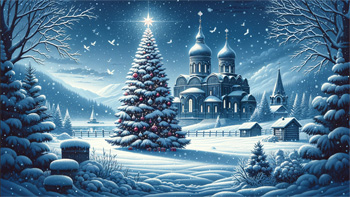 Orthodox Christmas Day in Russia
Orthodox Christmas Day in Russia


Orthodox Christmas Day in Russia is a deeply significant and richly traditional holiday that embodies the spiritual, cultural, and historical facets of the country. Celebrated on January 7th, this day is marked by religious observances, family gatherings, and unique customs that have been passed down through generations. Unlike Western Christmas, which follows the Gregorian calendar, Orthodox Christmas is observed according to the Julian calendar, which is 13 days behind.
The significance of Orthodox Christmas in Russia can be traced back to the introduction of Christianity in the country. Over the centuries, the holiday has evolved, incorporating various cultural elements along with its religious roots. It's a time when the spiritual aspect of the season is emphasized more than the commercial, making it a deeply reflective and solemn occasion.
Religious Observances and Church Services
Religious observances play a central role in the celebration of Orthodox Christmas in Russia. The night before Christmas, known as Christmas Eve, is marked by a special service called the Royal Hours, a solemn, meditative service that reflects on the birth of Jesus. The main Christmas service is the Divine Liturgy, held on January 7th, which often includes a procession and the singing of traditional Christmas hymns and carols. Many Russians fast until the first star appears in the sky on Christmas Eve, symbolizing the Star of Bethlehem, after which a festive meal is enjoyed.
The Russian Orthodox Church, with its rich liturgical tradition, adds a deep sense of reverence to the celebrations. The churches are beautifully decorated, often with Nativity scenes, and the air is filled with the scent of incense and the sound of church bells. This spiritual atmosphere is a pivotal part of the holiday, bringing families and communities together in a shared experience of faith and tradition.
Traditional Christmas Eve Meal
The Christmas Eve meal in Russia, known as the Holy Supper, is steeped in tradition and symbolism. This meal typically consists of twelve dishes, representing the twelve apostles. The dishes are meatless, in keeping with the Orthodox Christian tradition of fasting before religious feasts. One of the central dishes is "kutya," a sweet porridge made from wheat or rice, mixed with honey, poppy seeds, and dried fruits. It symbolizes hope and immortality.
Other traditional foods include "borshch" (beet soup), "vzvar" (a sweet beverage made from dried fruits and honey), and various types of fish. This meal is not just about feasting but is a time for families to come together, share stories, and remember departed loved ones. The sharing of the “kutya” is a particularly poignant moment, often accompanied by prayers and well-wishes for the coming year.
Family Celebrations and Customs
Family plays a crucial role in the celebration of Orthodox Christmas in Russia. After attending the church service, families gather to spend time together. Exchanging gifts is not as central as it is in Western Christmas traditions, but it is still a part of the celebration, particularly for children. The focus is more on the spiritual and relational aspects of the holiday.
Many Russian families also engage in traditional activities such as singing Christmas carols and reciting Christmas poems. These activities not only provide entertainment but also serve to pass down cultural heritage to the younger generations. In some regions, people dress up in costumes and go caroling, a practice known as "kolyadki," which is thought to bring good luck and prosperity.
Public Celebrations and Festivities
While Orthodox Christmas in Russia is primarily a family and religious holiday, there are also public celebrations and festivities. Towns and cities are adorned with lights and decorations, and public squares may host Christmas markets and live performances. In major cities like Moscow and St. Petersburg, the streets come alive with festive lights and decorations, adding to the joyous atmosphere.
These public celebrations are not just for show but are deeply ingrained in the cultural fabric of the country. They provide an opportunity for the community to come together, regardless of religious beliefs, to enjoy the festive season and celebrate the rich cultural heritage of Russia.
In conclusion, Orthodox Christmas Day in Russia is a multifaceted holiday that encompasses religious devotion, cultural traditions, and family values. Its celebration reflects the deep spiritual roots and the rich cultural tapestry of the Russian people. The emphasis on reflection, family, and tradition makes it a unique and profound observance, distinct from Christmas celebrations in other parts of the world. As a time of faith, family, and cultural celebration, Orthodox Christmas in Russia offers a glimpse into the soul of Russian culture and its enduring traditions.